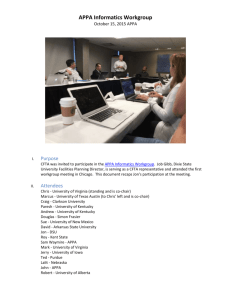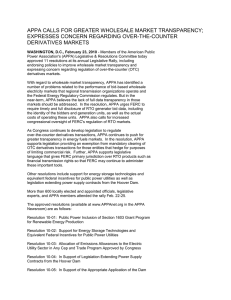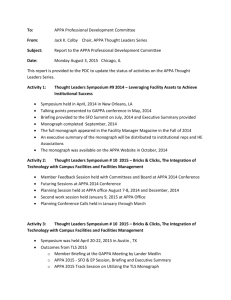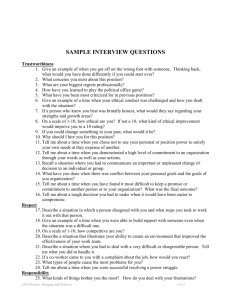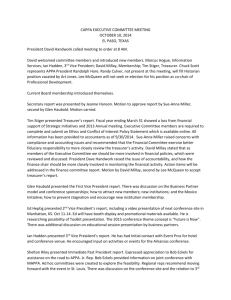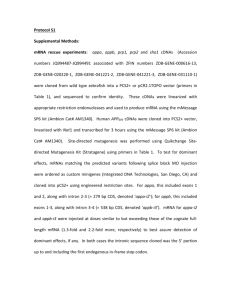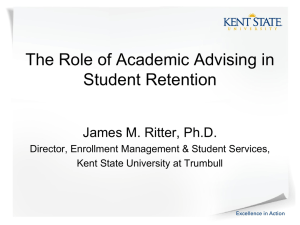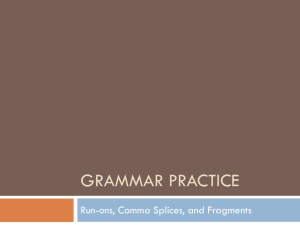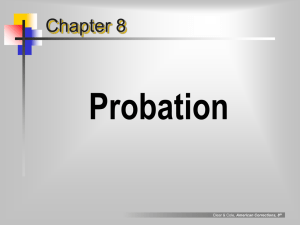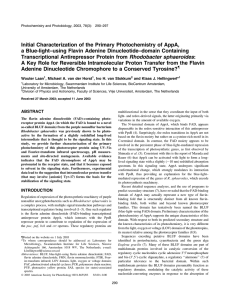The Leadership Institute
advertisement
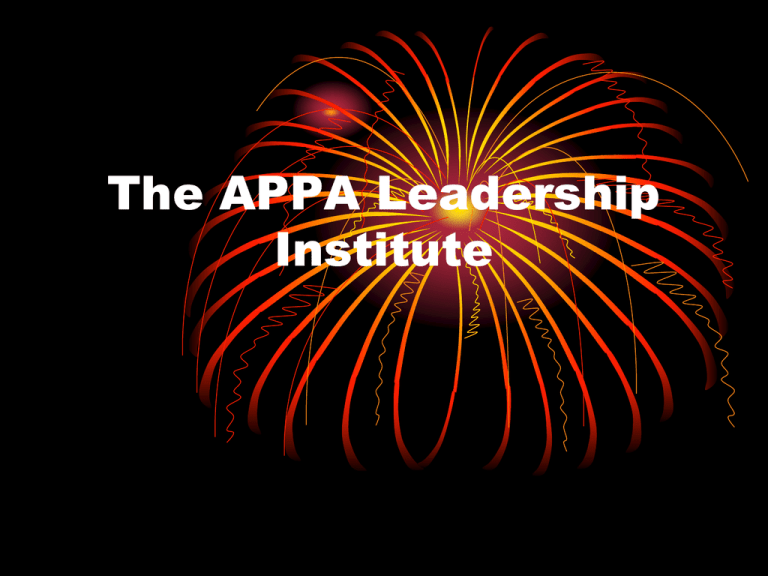
The APPA Leadership Institute Presenters Drew Molloy, VA Dept. of Criminal Justice Services Dee Bell, GA Dept. of Juvenile Justice Daisy Diallo, Advocate Program, Inc. Sarah Douthit, Coconino County Adult Probation Housekeeping • Please send questions through to presenters on the chat box on the right side of the screen. • At the end of the PowerPoint, we will show how to access the application materials. How Did We Get Here? • APPA recognizes the need for succession planning as the baby boomers retire • The need for new leadership is shared by the community corrections profession as well as allied organizations such as APPA Then… A six way partnership developed. The partners are: APPA NAPE NCTI NIC The Williams Institute CMIT Leadership Institute was Designed to: • The course is designed to provide participants with a fundamental understanding of leadership and management within the community corrections arena. • It is designed for people from various backgrounds and cultures; those who have had experience exercising leadership as well as those who have not. • It aims to increase one’s critical thinking skills and analytical abilities to sustain the demands of leadership and management and to further develop one’s capacity to exercise leadership and authority. • This course explores leadership and management issues from a practical point of view, in which theory becomes the basis for critical thinking. Students will interact directly with the instructors, facilitators, sponsors and with each other. The Goals of the Leadership Institute • Provide participants with a fundamental understanding of leadership and management within the community corrections arena. • Increase participants’ critical thinking skills and analytical abilities to sustain the increasing demands of leadership and management and to further develop the leadership capacity for organizational change. • Develop participants’ skills for navigating through various levels of the political system in organizations, including organizational units, and sub-service delivery systems to advance the objectives of community corrections. • Enhance participant’s professional growth through sustained interaction with a national network of community corrections leaders, managers, and executives. The Leadership Institute • Three 20 hour sessions at three successive APPA Institutes. • Two six month intersessions with multiple assignments between the Institutes. • A large individual project to develop and implement change in home agency. • Matched with a sponsor from APPA leadership to work with and learn from during the Leadership Institute. Participants were recruited for past 3 classes • Up to 25 participants • Agencies from across the country • Supervisors, middle management to chief officers • Widely diverse in all aspects Sponsors Sponsors were recruited from the partnership agencies and agreed to: • Commit their time and passion to being an effective sponsor. • Be involved with the assigned participant by email, phone, web, or person-to-person as needed. • Meet face-to-face with the participant during three APPA training institutes. • Assist the participant in the development of their assigned projects. Faculty • Recruited from all six partner agencies • Taught at the three Institutes • Assisted in curriculum development • Many have also been sponsors for participants Some of the past projects have included: • A plan for geographically distributed caseloads in a large county in Texas. • A number of projects involved in implementation of evidenced based practice in probation departments from the county level through the state level. • A number of large re-entry projects for both adult and juvenile offenders returning to the community to include vocational/job training initiatives, assistance in gaining necessary identification and records, housing assistance and life skills training. • Training and implementation of Motivational Interviewing for large probation departments. • Development of a domestic violence program. Projects- continued • Development, policy and practice for model drug courts. • Juvenile Diversion Courts from planning through implementation. • Development of Ethics Policy/Code of Conduct, for the New York State Probation Officers Association to include training plan. • Development of a clinical intern training program for a large Iowa Probation Department. • Development of a delinquency pre-screening tool, piloting of the tool, and training of the probation staff as well as community partners in effectively using the tool to identify early risk factors to delinquency. • Development of a state probation agency's vision, mission and goal statements. Outcomes: • Three successful classes have been conducted. 67 new leaders in the field of community corrections- many new promotions… and job assignments • Graduates are now APPA Executive Committee Members, Board of Directors Members, Committee Chairs and APPA Institute Program Chairs. • Outstanding projects that benefited the home agencies of the participants. • New leaders for APPA, NAPE and other organizations that are well networked with current community corrections leaders. What’s the word on LI? • “The dividends we gain from his will serve our organizations and profession for the years to come” • “The leadership institute has facilitated a process where I am exposed to a number of leadership models and meet successful corrections administrators that effectively embody these models.” • “Professionally, the leadership institute has increased my awareness of management and leadership skills…it enabled me to reflect on my behaviors, and hone my skills as the leader of my team and within my department.” LI Materials and Information • http://www.appa-net.org/eweb/ Next? • Recruitment is underway for the Fourth Class of the APPA Leadership Institute. • Applications are available now! • Recruitment of new Sponsors for the next class. • Questions?????
